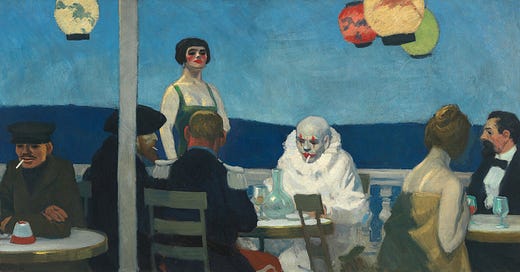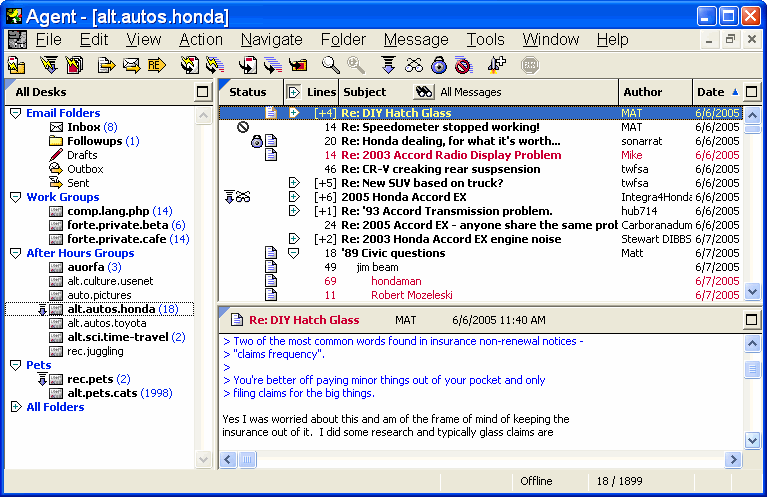A TikTok therapist just had a meltdown online. After crying about how much he hates his job — too many people complaining to him, not enough people thinking of him as a human being — he posted a follow-up video to say that he had just lost his license.
“You all got your wish,” the caption read as he tearfully recounted the loss of his career and income, all because of a vulnerable TikTok video.
Like so many of the main characters of the day we see on Twitter, the therapist delivers a sorrowful message about what happens when we overshare online.
But he’s not real.
Daniel Hentschel is a real person of course. Dan, if you’re reading this, hello! I love your work! He’s just not a therapist.
That’s the other lesson that TikTok main characters of the day are constantly teaching us. Nothing is real. Err on the side of a video being fake It takes a lot of drama to stand out over the millions of TikTok videos posted every day. It’s easier to achieve that drama level with…well, lies about $3 cheese. Or in Daniel’s case, satire.
A closer look at Daniel’s profile reveals exaggerated videos about catching your partner snooping on your phone (paint it with black food coloring!) or signs of mental illness in your friends’ texts (ellipses are a sign of dementia!) It takes about two seconds to realize this man is not a real therapist, but he is very funny.
In the comments, viewers clowned on him for his behavior. They really seem to have bought it! Some choice replies include “you just gave me trust issues with my therapist,” and “never telling my therapist anything again, got it”. You guys!! This is very clearly a joke.
A question I got time and time again when I tweeted about this saga was How are people falling for this? For the most part, people are jarringly lazy and media illiterate when it comes to social platforms.
But there’s another reason that I think about a lot, both in the context of fake outrage bait on social media, and every time I see someone blame Gen Z for bringing back unfavorable jean trends or hairstyles. It’s called eternal September.
What originated as slang to describe a period in which there was a sudden influx of new folks on Usenet, a pre-internet internet thing. It was at first only really accessible on college campuses, so with a rush of new students in the fall came a slew of uninformed new members. In 1993, the user base began to extend beyond college kids, there were constantly confused newbies online annoying the seasoned users. They were constantly educating newbies on the etiquette of the web and getting irked by their failures. The new outnumbered the old.
In the Gen Z internet era, we are constantly surrounded by young people who are extremely familiar with their personal algorithms, but still have a lot to learn about the world. What we get is a bunch of extremely efficient video/photo editors who are quick to catch on trends, but often fall for outrage bait that many people have already learned to let pass them by. TikTok constantly yeets small creators or unsuspecting persons into the spotlight. One second, you’re posting dumb comments to your friends. The next, you’re the star of the latest discourse.
Young folks are well-versed in how to be cool — we are so constantly looking to them to set those trends — but they don’t always know that everything doesn’t have to be so… serious all the time.
As a result, younger internet users are stuck in eternal September, or at least prolonged September. They’re always the new kids on campus, and the campus is the world. They get the rules of the platform, but they don’t have the lived experience to debunk everything yet.
When we put Gen Z under a perpetual microscope, study the mistakes they made, and project them onto a new generation, we’re doing them a disservice and misunderstanding the world. It happened when boomers blamed the millennial housing crisis on avocado toast, and it happens every five seconds when someone takes an out-of-context screenshot of a TikTok and shares it on Twitter.
Of course, people of all ages fall for rage bait online. It’s human nature AND algorithmic nature to feed into your emotions and believe you’re right all the time. The older folks doing that with culture wars are another story about polarization, moral outrage, and politics. But this Gen Z symptom has a very obvious cause.
Why did so many people fall for this fake therapist? Because a lot of them are new here. Give them grace. Well, roast them, then just move on. There’s a new sucker born every minute. Bless them. Bless us all. Every day brings fresh nonsense.
are you having FUN???? subscribe to the paid version of my newsletter for literally double the content. DOUBLE.
current obsession
I’m obsessed with watching videos of people setting up their tiny planners on YouTube. None of these people are particularly famous or quiet or well-lit…EXCEPT for one, the queen, Lindsey Scribbles. Everyone credits her ideas in their videos. She only has 23,000 followers and she rules my life. Do not get this confused with bullet journaling, it’s much less intense.
news you can lose
Andrew Tate is doing weirder posts than usual
The Palmer Hotel guy is the Gene Parmesan of Twitter. He always gets me!
Tumblr moments to cherish
Democracy has failed you, my sweet Al Pacino
A YouTuber is going to plead guilty to federal charges after crashing a plane for a stunt!
keeping up with the content
chloe sevigny’s clothing sale was ….. (Paris Review)
For Gen Z, Playing an Influencer on TikTok Comes Naturally (NYT)
What happens when you ask AI to control your life (Vice)
I’m a TV writer on food stamps (The Cut)
The return of the p*rn wars (Vox)
Are Core Trends Ruining Our Sense Of Personal Style? (Nylon)
Stealth Wealth is not a thing (The Atlantic)
TikTokers on Tarte Cosmetics' Latest Excursion Pulled Back the Curtain on Influencer Brand Trips (Time)
Bullying the Bullies on Social Media (Lens)
Keep BlueSky Weird (Vice)
The Root of Gen Z’s Hyperindividualism (Embedded)
see you sunday!








Very wise!